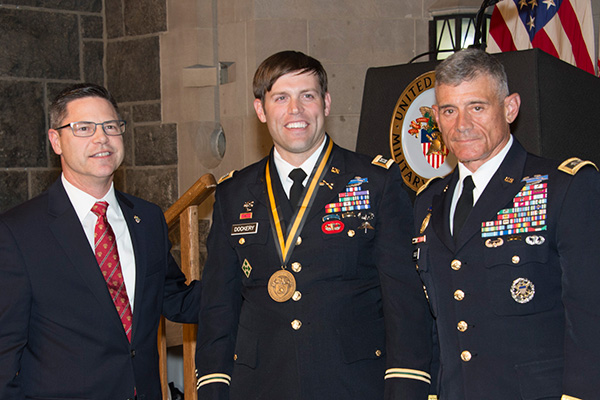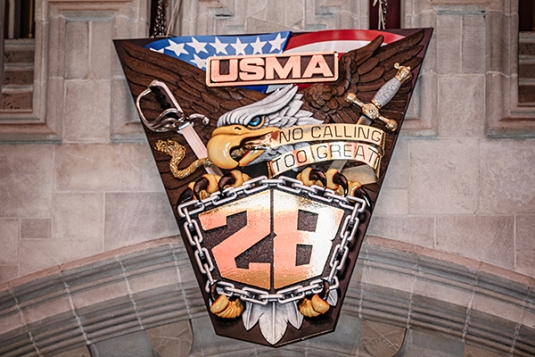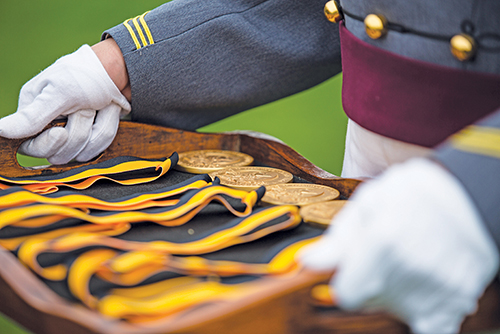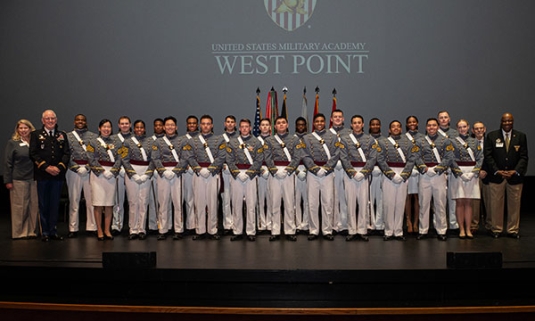Captain Nick Dockery ’11 was presented with the 2017 Alexander R. Nininger Award for Valor at Arms during a ceremony in the Cadet Mess Hall on September 28, 2017. As noted by Todd Browne ’85, President and CEO of the West Point Association of Graduates (WPAOG), in his remarks introducing the recipient, the Nininger Award is WPAOG’s third major award (along with the Thayer and Distinguished Graduate awards), “reflecting heroism, courage, and character while serving in the Profession of Arms.” Established in 2006, the Nininger Award was endowed by E. Douglas Kenna ’45 and his wife, Jean, and is named for Second Lieutenant Alexander R. Nininger ’41, who fought the enemy to his death during the Battle of Bataan in January 1942 and posthumously received World War II’s first Medal of Honor. View photos here.
On October 2, 2012, then Second Lieutenant Dockery was serving as platoon leader in Company C, 2nd Battalion, 12th Infantry (4th Brigade Combat Team), 4th Infantry Division as part of Task Force War Eagle in Kapisa Province, Afghanistan, leading eight U.S. troops and a handful of Afghan soldiers and police forces. During a patrol to secure the Tagab District Center, a well-armed Taliban force ambushed Dockery’s unit. “Over the course of four hours, Nick’s courage, his selflessness, and aggressive leadership while under enemy fire saved the lives of two soldiers and prevented the capture of a third,” Superintendent Lieutenant General Robert L. Caslen Jr. ’75 told the Corps of Cadets assembled for the ceremony. One of the Soldiers whose life Dockery saved by tackling him and then shielding him from a grenade blast was the Nininger recipient’s squad leader, Staff Sergeant Eric Mitchell (now Retired), who attended the ceremony as Dockery’s guest and was recognized during his acceptance speech.
“Awards like this are never earned by one person; they are earned by a team,” Dockery told cadets. “Every time I heard the crack of a bullet whizzing past my head, I knew Eric was there at my side ready to return fire so that I could focus on my job.” Using his relationship with Mitchell as an example, Dockery presented the Corps with an important lesson regarding their immediate future responsibilities. “If there is one theme that echoes in my soul that every lieutenant needs to know, it’s the importance of building a strong team, especially with your NCOs,” Dockery said. “West Point will make you an officer, but your NCOs will make you a platoon leader.”
Beyond telling cadets to “build relationships” now, Dockery also advised them to trust in the system that West Point has in place. “All of your experiences here are part of a unique journey that will make you, like it did for me on October 2, 2012, capable of flipping your M4 carbine rifle to three-round burst, charging down an alleyway alone under enemy fire, killing the enemy, and preventing them from capturing your wounded team leader.”
His lessons in his acceptance speech were taken to heart by cadets. “Having speakers like Captain Dockery come to West Point is definitely inspirational to me and the rest of the Corps,” said Cadet Ethan Porter ’20 after the event. “He reinforced that every cadet at West Point has the potential to face adversity during those critical occasions that test their worth.”
Dockery recently attended the Special Qualification Course at the John F. Kennedy Special Warfare Center and School, the Special Operations Center of Excellence at Fort Bragg, North Carolina. His awards and decorations include the Silver Star Medal, the Bronze Star Medal with oak leaf cluster, the Purple Heart Medal, the Army Commendation Medal, the Army Achievement Medal, the National Defense Service Medal, the Afghanistan Campaign Medal, the Global War on Terrorism Medal, the Overseas Service Ribbon, the Meritorious Unit Commendation with oak leaf cluster, the Combat Infantryman Badge, the Basic Parachutist Badge, the Air Assault Badge, and the Ranger Tab.
Announcement
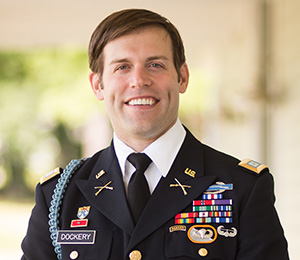
July 6, 2017
West Point, NY: The West Point Association of Graduates is pleased to announce that Captain Nicholas “Nick” Dockery, Class of 2011, has been selected to receive the 2017 Alexander Nininger Award for Valor at Arms. The award will be presented on September 28, 2017, at West Point, New York.
Dockery graduated from West Point in 2011 and calls Indianapolis, Indiana his hometown. He is currently an Infantry officer attending the Special Forces Qualification Course at the John F. Kennedy Special Warfare Center and School, the Special Operations Center of Excellence, at Fort Bragg, North Carolina. His awards and decorations include the Silver Star Medal, the Bronze Star Medal with oak leaf cluster, the Purple Heart Medal, the Army Commendation Medal, the Army Achievement Medal, the National Defense Service Medal, the Afghanistan Campaign Medal, the Global War on Terrorism Medal, the Overseas Service Ribbon, the Meritorious Unit Commendation with oak leaf cluster, the Combat Infantryman Badge, the Basic Parachutist Badge, the Air Assault Badge, and the Ranger Tab.
In 2012, Captain Dockery deployed as an Infantry Rifle Platoon Leader in support of Operation Enduring Freedom with 2nd Battalion, 12th Infantry Regiment, 4th Brigade Combat Team (Light), 4th Infantry Division, Fort Carson, Colorado to Kunar Province, Afghanistan. As a member of Task Force Lethal Warrior, Captain Dockery trained and worked with Afghan National Security Forces in the Dewegal Valley and Chowkay District. In September, Captain Dockery’s unit was reassigned to the Tagab District in Kapisa Province to work under Task Force War Eagle alongside the French Military. In October, Captain Dockery was wounded in a direct fire engagement from hand grenades and rocket propelled grenades. Captain Dockery stayed in country and finished the deployment as a Platoon Leader.
Speech

Lt. General and Mrs. Caslen, Mr. Browne, distinguished guests, and members of the Corps of Cadets, good evening and thank you.
I am honored to represent all West Point graduates who have led Soldiers in battle and I am humbled to stand before you as a recipient of the Nininger Valor at Arms award, named in honor of Sandy Nininger, USMA Class of 1941.
First, permit me to thank my loving family for their unwavering support, especially my wonderful grandmother Mary. And a special thank you to two close mentors who have guided me throughout my career—Mr. Joe Fabey and COL Steve Isenhour Class of ’93.
Next, I’d like to recognize my former Squad Leader SGT Eric Mitchell—who is here tonight. Eric is the definition of a warrior and a Noncommissioned Officer. We fought together through countless battles. Every time I heard the crack of a bullet whizzing past my head, I knew Eric was there at my side ready to return fire so that I could focus on my job. I was invited here to speak partly because I received a Silver Star. However, awards like this are never earned by one person—they are earned by a team.
Company E4…where are you? That was my company. [Hold of applause] I loved that Company. It’s a great company and all of you should be proud of your company’s legacy. But in this moment, I am remembering my three friends from E4 who gave their lives fighting for our Country—Dimitri Del Castillo ‘09, John Runkle ‘09 and David Rylander ‘11. No award can match the sacrifice these brave men gave and I feel a great responsibility to honor their actions. Not a day passes that I do not reflect on the heroic actions of these men and I am grateful I was part of Team E4 with them.
If there is one theme that echoes in my soul that every Lieutenant needs to know—it is the importance of building a strong team—especially with your NCOs. If I got everything else wrong as a Platoon Leader—I am certain I got one thing right: building solid relationships that would not only withstand combat but—forged in battle—would grow stronger. West Point forges men and women into capable Leaders our nation needs to lead Warriors in Combat AND prevail. But until that time comes for you, take it day by day.
Sometimes valorous award citations seem to read like a movie script, in contrast to the raw reality on the ground. I can’t say with certainty that my citation will teach you much about being a Platoon Leader. So tonight, I would like to share with you my first day as a Platoon Leader in 2012. I met a seasoned Platoon of Infantrymen in Afghanistan three months into their deployment. On my first patrol, I found myself walking across old opium fields in 100 degree plus heat of the Dewegal Valley, in Kunar Province. My task that day was to meet local leaders from the small village of Chambel. After the meeting ended, my Platoon began to climb the steep rocky walls back to our vehicles when we fell into an ambush from the top of the mountainous ridge lines. I would soon learn that deep in the valleys our radios could never reach our Operations Centers or TOCs. Running back to my vehicle, I jumped in, slammed the door, and feverishly began typing on my Blue Force Tracker… “Troops in Contact—Troops in Contact! Urgent!” My heart was beating out my chest—I stared at the screen and waited…and waited….and waited. For what I wasn’t exactly sure, but as I listened to rounds pinging off the truck’s armor and RPGs exploding on the rocky terrain near our convoy, the side door opened—and the Platoon Leader I was replacing handed me a local issued cell phone and said, “I got the TOC.” The voice on the other side impatiently said, “Sir—this is 1SG—get your TAC SAT radio up and send me a Situation Report” **click**. I looked around, realized the RTO and the TAC SAT radio were in the rear vehicle—250 meters away. I said a few inappropriate words, and before walking through the engagement area, I thought two things: (1) don’t get shot, and (2) don’t let the boys see you scared on the first fight. So, I briskly walked from truck to truck—gave the turret gunners a thumbs-up, smiled and said to them, “Keep shooting.” I was buying time and trying to look calm.
When I made it to the rear of the convoy, I saw my Platoon Sergeant standing off to the side of the last truck, in the open, as rounds impacted around him, yelling at the Mark-19 grenade launcher gunner to fix the weapon jam or switch to a machine gun. He casually said to me: “What’s up sir? You talk to higher?” I responded, “I need TAC SAT.” My Platoon Sergeant banged on the tailgate and yelled—“PL needs TAC SAT—you have 1 min!!!” Magically, an antenna and handset popped up from the top hatch. I then proceeded to send a very convoluted and garbled radio transmission—which elicited the response “Uhhhhh, say again, over.” I’ll admit I was a bit overwhelmed—so I took a knee, looked at my map, took a VERY deep breath—and tried again. This time I got a “Roger, copy all, plotting your position, stand by.”
From that point, I made sure I stayed clam. I gave a thumbs-up to my Platoon Sergeant and began coordinating fires with the mortar team and machine guns, directing rates of fire and marking targets with indirect rounds. After shelling the enemy on the ridge line, my Commander radioed that close air support was coming to our location. My Forward Observer said, “Sir, air is clear, pushing the pilot to your frequency.”
And there I was. 2LT Dockery. First day as a Platoon Leader, first firefight…with every ear in the Battalion TOC listening to my transmissions and every man on the ground watching my actions—talking to a fighter pilot, asking me for my initials and clearance to engage enemy fighters. I gave them the okay and the A-10 dumped hundreds of rounds on the enemy with the Pilot confirming that I wanted another gun run. Three gun runs later, I approved the Apaches to destroy the remaining fighting positions. I sent up my reports to higher, and it wasn’t even lunchtime yet.
On the walk up to the entry control point to our Combat Out-post, my Platoon Sergeant with 18 years of service and on his fifth combat deployment said to me…and…I’m paraphrasing…“Dang, the LT’s calm under pressure—good stuff.” In that moment, it became apparent to me what my Platoon needed from me. They needed someone to listen to their reporting, process information, describe to the command team what was occurring on the ground, and control the men and firepower in the fight. They needed that leadership at that moment and they deserved that everyday.
If there is one word that describes my life as a cadet—that word is “survive.” Though I stand before you today as a Green Beret, as a cadet it took me 3 YEARS before I found the thing at West Point that gave me more than just a “trying to survive” experience. And I didn’t find that “thing” in the classroom. For me, that thing was serving as the Firstie Club Guy, which was back then a Brigade level position. This job was one of my most fulfilling experiences at West Point. I received great satisfaction in building networks and relationships with my Classmates and other organizations at West Point.
All of your experiences here are part of a unique journey that will make you, like it did for me on October 2 2012, capable of flipping your M4 carbine rifle to 3 round burst, charging down an alleyway alone under enemy fire (which I don’t recommend), killing the enemy, and preventing them from capturing your wounded team leader. Your mettle is tested here on West Point’s fields of friendly strife long before your boots hit the ground in combat. And when the time comes to tackle YOUR Squad Leader to shield them from a grenade or climb on a roof top to call for close air support—you need not spend time thinking, because you will just do it.
Your NCOs will know their jobs. Listen to them. You need to know your job, but that will come one day at time—one rehearsal at a time starting with your experience here. I’m confident that there are moments right now in combat where men like SGT Mitchell are doing their jobs, leading Soldiers and using their skills and experience to save their Platoon Leaders’ lives so those Platoon Leaders can do THEIR jobs.
Make your experience here more than just “trying to survive.” Build relationships with your classmates now, just as you will with your NCOs and soldiers in the future. TRUST in the system here. West Point will make you an Officer—and your NCOs will make you a Platoon Leader.
Thank you to the Kenna Family, the West Point Association of Graduates, and the Corps of Cadets for this great honor.
God Bless you, the United States Military Academy, and the United States of America.
For Freedom We Fight
De Oppresso Liber

